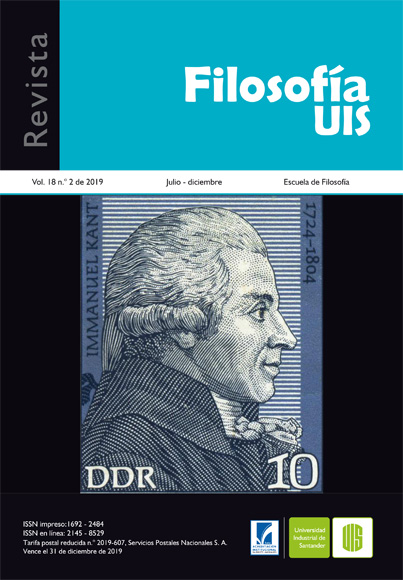Translation. Law, Reason and Emotion
Published 2019-05-13
Keywords
- Law,
- reason,
- emotion,
- justice,
- rule of law
- legitimacy,
- effectiveness ...More
How to Cite
Copyright (c) 2019 Revista Filosofía UIS

This work is licensed under a Creative Commons Attribution 4.0 International License.
Abstract
Law, reason, and emotion have a long, close, and complicated relationship in the history of philosophy and justice. This discussion suggests that that law gains legitimacy and effectiveness when it marries reason with emotion, that reason and human emotion are the guiding values of any just legal system, that all legal systems claim to be just, and that all legal systems and all legal scholars make use of these insights whether they acknowledge them or not. The project here in the first instance is one of definition: "law", "reason", "emotion", "justice", "effectiveness", and "the rule of law" all require specification to better understand how they relate to one another and set the agenda for further conversation. The first step is to consider how these words have been and should be used for the better understanding and eventual improvement of law and society. Reason and emotion are the twin pillars of the law, which make the law legitimate, just, and effective when they are properly taken into account and otherwise not. No one can properly understand law without reference both to human emotion and to the purpose law properly exists to serve, which is the rational well-being of each and every member of society.
Downloads
References
Agustín de Hipona (1947). De libre albedrio. En San Agustín. Obras completas III. Madrid: Biblioteca de Autores Cristianos.
Aristóteles (1998). Política. (M. García Valdés, trad.). Madrid: Gredos.
Bisaz, C. (2015). Appropriate allocation of authority in diverse democracies. The boundary problem of democratic theory, societal diversity, and subsidiarity. Archiv für Rechts-und Sozialphilosophie, 101(1), 60-74.
Botero, A (2004). La corrupción: tensión entre lo político y lo jurídico. Opinión Jurídica, 3(6), 37-58.
Cicerón (1913). De officiis. London: London Heinemann.
Cicerón (2006). De Legibus. En Cicerón, De Re Publica, De Legibus, Cato Maior de Senectute, Laelius de Amicitia. New York: Oxford University Press.
Coke, E. (1607). Prohibitions Del Roy. En E. Coke. Reports Vol. 12, (p. 63).
Coke, E. (1826). Reports Vol 4. London: Joseph Butterworth and Son.
Coke, E. (2003). The selected writings and speeches of Sir Edward Coke (Vol. 2). Indianapolis: Library Fund.
Fleming, J. & Levinson, S. (2012). Evolution and Morality. New York: New York University Press.
Fleming, J. (2013). Passions and Emotions. New York: New York University Press.
Haidt, J. (2003). The moral emotions. En R. Davidson; K. Scherer & H. Goldsmith. Handbook of Affective Sciences (pp. 852-870). Oxford: Oxford University Press.
Hauser, M. (2006). Moral Minds: How Nature Designed Our Universal Sense of Right and Wrong. New York: Harper Perennial.
Hobbes, T. (1750). The English Works (Vol VI). London: John Bohn.
Hobbes, T. (1980). Leviatán. O la materia, forma y poder de una república eclesiástica y civil. (M. Sánchez, trad.). Ciudad de México: Fondo de Cultura Económica.
Jefferson, T. (1776). The Declaration of Independence of The United States of America. Recuperado de https://www.uscis.gov/sites/default/files/USCIS/Office%20of%20Citizenship/Citizenship%20Resource%20Center%20Site/Publications/PDFs/M-654.pdf
Mill, S. (1991). On liberty. New York: Routledge
Platón (1988). Diálogos Vol. IV (República). (C. Eggers, trad.). Madrid: Gredos.
Platón (1999). Diálogos Vol. VIII (Leyes I-VII). (F. Lisi, trad.). Madrid: Gredos.
Pope, A. (1881). Essay on Man. Oxford: Oxford University Press.
Sellers, M. (1991). The value and purpose of law. Oxford Journal of Legal Studies, 11(2), 273-282.
Sellers, M. (2004). The value and purpose of law. University of Baltimore Law Review, 33(2), 145-151.
Sellers, M. (2012). Parochialism, Cosmopolitanism, and the Foundations of International Law. New York: Cambridge University Press.
Sellers, M. (2017). Law, Reason, and Emotion. En M. Sellers (ed.), Law, Reason, and Emotion (pp. 11-31). New York: Cambridge University Press.
Tasioulas, J. (2012). Parochialism and the Legitimacy of International Law. En M. Sellers (ed.), Parochialism, Cosmopolitanism, and the Foundations of International Law, (pp. 16-39). Cambridge: Cambridge University Press. doi:10.1017/CBO9781139044165.003
Taylor, G. (1975). Justifying the Emotions. Mind, 84(335), 390-402.
Tomás de Aquino (1993). Suma de teología I-II. Madrid: Biblioteca de Autores Cristianos.
Unger, R. (1983). The Critical Legal Studies Movement. Harvard Law Review, 69(3), 561-675.
United Nations (1948). Declaración Universal de Derechos Humanos. Recuperado de http://www.ohchr.org/EN/UDHR/Documents/UDHR_Translations/spn.pdf
United Nations (1966). International Covenant on Civil and Political Rights. Recuperado de https://www.ohchr.org/Documents/ProfessionalInterest/ccpr.pdf
United Nations (1966). International Covenant on Economic, Social, and Cultural Rights. Recuperado de https://www.ohchr.org/Documents/ProfessionalInterest/cescr.pdf
